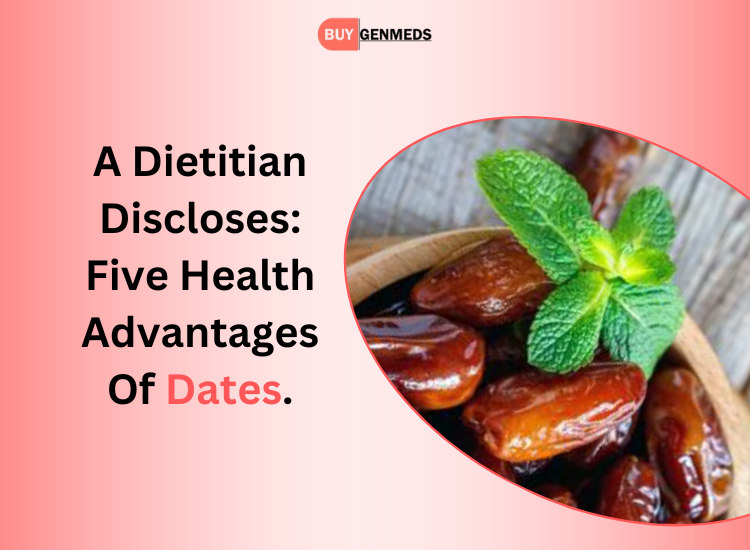Dates, a fruit cultivated from the date palm tree (Phoenix dactylifera), have been a staple in Middle Eastern cuisine for thousands of years. While often enjoyed for their natural sweetness and versatile culinary uses, dates are also highly prized for their remarkable health benefits.
Recent trends in nutrition science have drawn attention to the health advantages of including dates in one’s diet, leading many health-conscious individuals to add this superfood to their daily meals.
As a registered dietitian, I have witnessed firsthand the transformative effects of whole foods, including dates, on human health. This article will delve into five significant health benefits of dates, explaining how their nutritional profile can support overall wellness.
Nutrient-Dense Powerhouses: A Compact Source of Vitamins and Minerals
Date are more than just a sweet snack—they pack a variety of essential vitamins, minerals, and nutrients into every bite. For a small serving size, they deliver a significant nutrient punch, making them an excellent choice for those who want a quick source of energy and nourishment without consuming large quantities of food.
Key Nutrients in Dates:
- Fiber: Dates are rich in dietary fiber, which promotes digestive health and can help maintain regular bowel movements. Just a handful of Date can provide a substantial portion of the daily recommended fiber intake, making them an ideal food for those dealing with constipation or digestive irregularities.
- Potassium: Potassium is an essential electrolyte that supports proper heart function, muscle contractions, and fluid balance. A serving of dates provides more potassium than a banana, making them a valuable food for anyone looking to optimize cardiovascular health.
- Magnesium: This mineral plays a critical role in over 300 enzymatic reactions in the body, including those that regulate blood pressure, blood sugar levels, and nerve function. Dates contain a notable amount of magnesium, helping to support overall metabolic function and prevent deficiencies.
Dates also contain small amounts of calcium, phosphorus, zinc, and manganese, all of which play a role in maintaining healthy bones, skin, and metabolic function.
Promoting Digestive Health and Gut Microbiome Balance
Date are a natural source of soluble and insoluble fiber, both of which are vital for maintaining digestive health. Soluble fiber dissolves in water and helps to slow digestion, aiding in the regulation of blood sugar and cholesterol levels. Insoluble fiber, on the other hand, adds bulk to stool and helps to prevent constipation by promoting regular bowel movements.
Prebiotic Effects:
One of the lesser-known health benefits of dates is their prebiotic effect on the gut microbiome. Dates contain compounds that nourish beneficial gut bacteria, promoting a balanced and healthy microbiome. A healthy microbiome is critical for proper digestion, immune system function, and overall metabolic health.
Several studies have indicated that a diet rich in fiber from date and other fruits may help reduce the risk of colon cancer, diverticulitis, and other digestive disorders. By feeding the gut’s healthy bacteria, dates may also support improved immune system function and reduce inflammation in the digestive tract.
Natural Energy Boost: A Healthier Alternative to Processed Sugars
If you’re looking for a quick, natural way to boost energy levels, dates are an excellent choice. Their natural sugars—glucose, fructose, and sucrose—are quickly metabolized by the body, providing a rapid source of energy without the crash often associated with processed sugars.
Sustained Energy:
Unlike refined sugars, which can lead to spikes and crashes in blood sugar, the fiber content in dates helps to slow the absorption of sugar into the bloodstream. This results in a more sustained release of energy, making dates an ideal snack for athletes, students, or anyone needing a steady source of fuel throughout the day.
Additionally, dates are a popular ingredient in energy bars, smoothies, and other health-conscious snacks because they offer a natural way to sweeten food while adding nutrients like fiber, potassium, and antioxidants.
Post-Workout Snack:
Dates are also highly regarded as a post-workout snack, providing quick energy replenishment while supporting muscle recovery through their potassium and magnesium content. Combining date with a source of protein, such as nuts or yogurt, creates a balanced snack that replenishes glycogen stores and repairs muscles after exercise.
Powerful Antioxidants to Combat Oxidative Stress
Oxidative stress, caused by an imbalance between free radicals and antioxidants in the body, is a key contributor to aging and various chronic diseases, including heart disease, cancer, and neurodegenerative disorders. Dates are rich in powerful antioxidants that help neutralize free radicals, reducing the damage caused by oxidative stress.
Antioxidants Found in Dates:
By incorporating date into your diet, you can increase your intake of these important antioxidants, supporting long-term health and reducing your risk of chronic disease.
Heart Health Support: Lowering Cholesterol and Blood Pressure
Heart disease is one of the leading causes of death worldwide, and diet plays a significant role in both preventing and managing cardiovascular health. Dates are a heart-healthy food that can be beneficial for lowering cholesterol and maintaining healthy blood pressure levels.
Impact on Cholesterol Levels:
Date are free from cholesterol and contain both soluble and insoluble fiber, which can help reduce levels of LDL (low-density lipoprotein) cholesterol, often referred to as “bad cholesterol.” High LDL levels are associated with an increased risk of heart disease, so consuming fiber-rich foods like Date can contribute to lowering cholesterol and promoting heart health.
Blood Pressure Regulation:
Potassium, an electrolyte abundant in dates, plays a crucial role in maintaining healthy blood pressure levels. Studies have shown that potassium helps relax blood vessel walls and reduces the effects of sodium, which can contribute to high blood pressure.
Consuming foods high in potassium, like dates, may help reduce the risk of hypertension and improve overall heart function.
Additionally, the magnesium content in dates further supports heart health by helping to regulate blood pressure and preventing the hardening of arteries. This can lead to improved circulation and a reduced risk of heart attacks or strokes.


